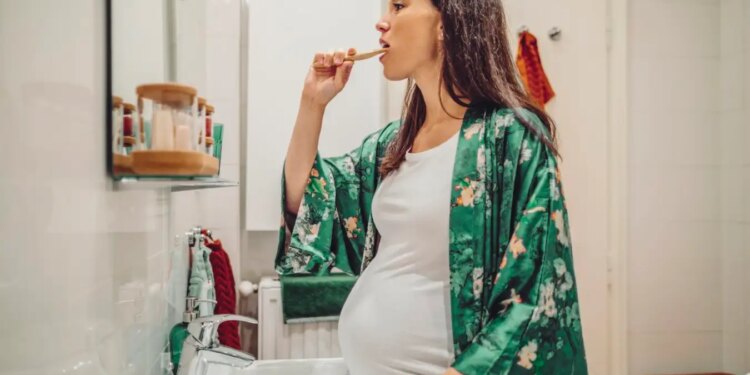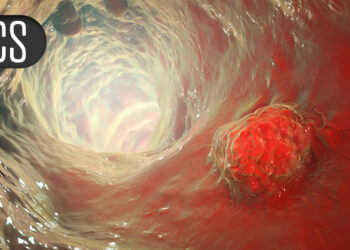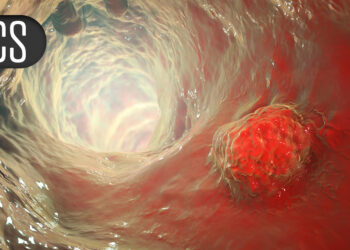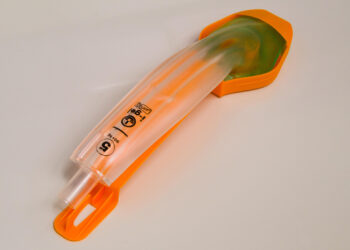
Maintaining good oral hygiene may be particularly important during pregnancy
Kondoros Eva Katalin/Getty Images
“Gain a child, lose a tooth”, or so the saying goes. Pregnancy is known to be linked to a heightened risk of dental issues, but we aren’t entirely sure why. Now, researchers have found that the oral microbiome changes while a woman is expecting, becoming less diverse and potentially more prone to causing inflammation.
The hormonal upheaval during pregnancy is generally blamed for the higher risk of conditions like gum disease and tooth decay. A common idea also states that fetuses take calcium from their mother’s teeth, which isn’t backed up by evidence.
Disruptions to the oral microbiome, which is made up of more than 700 species of bacteria, can cause dental problems, regardless of whether or not someone is pregnant. But Yoram Louzoun at Bar-Ilan University in Israel and his colleagues wanted to understand whether this generally stable ecosystem changes during pregnancy, so they collected saliva samples from 346 women from Israel at 11-14 weeks, 24-28 weeks and 32-38 weeks of pregnancy, representing all three trimesters.
The researchers saw a drop in the diversity of species in the saliva samples as early as the transition between the first and second trimester – and it then decreased progressively throughout the rest of the pregnancy. Key features included a reduction in the numbers of the species Akkermansia muciniphila, often thought of as a “good bacterium”, and an increase in Gammaproteobacteria and Synergistota bacteria, which are linked to inflammation.
“Typically, the oral microbiome is stable, but over many years, there is a slow decrease in diversity,” says Louzoun. “Pregnancy is like a fast-forward of that very slow evolution. You can see the changes that normally happen over many years in just nine months.”
There are many possible reasons for why these changes – albeit small overall – happen. “You’ll have lots of things going on during your pregnancy, like changes in hormones and inflammation, which will also alter the microbiome,” says Lindsey Edwards at King’s College London. “And obviously, during pregnancy, you are often changing your diet. You might also feel nauseous and not be eating, and you may also stop taking medications if you know that you’re pregnant. All of these could have effects.”
The women completed dietary and health questionnaires, which allowed the researchers to identify distinctive, but similar, effects among certain women, such as those who said they ate a gluten-free diet, took antibiotics, were stressed, or were current or ex-smokers. “Most women stop smoking when they’re pregnant, but you see the effect of the fact that they used to smoke, perhaps nine months ago, in the microbiome,” says Louzoun. “It has a really long-term effect.”
Comparable changes were evident in a second experiment, where the researchers examined the oral microbiomes of 154 pregnant women from Russia during their second and third trimesters.
Although pregnancy is known to increase the risk of dental issues, Louzoun doesn’t necessarily think changes to the oral microbiome are behind this, given that such problems can start very early in pregnancy. “I cannot really say if all these microbiome changes are positive or negative, but they definitely are fast,” he says.
Yet Edwards says the microbial changes might be a factor, noting that saliva also becomes more acidic during pregnancy, altering its bacterial species.
Valentina Biagioli at the University of Genoa in Italy says changes to the oral microbiome and hormone levels throughout the body could both play a part, because they interact with, and affect, each other. “There is a plausible biological rationale connecting the observed changes in the oral microbiome to the most common dental problems reported during pregnancy, including tooth loss,” she says.
Disruptions to the oral microbiome have been linked to pregnancy complications, so if we establish what an optimal version of this ecosystem looks like, it could be used to gauge how a pregnancy is progressing. “Once we have the baseline oral microbiome of pregnancy, it can be used to detect deviations,” says Louzoun.
We are also learning more about this microbiome’s role in the immune system, which could affect the health of both pregnant women and their fetuses. “The microbiome is helping to educate your immune system and it’s a bidirectional link,” says Edwards.
Better understanding how to maintain your oral microbiome – for instance, through good dental hygiene and a diverse, nutrient-rich diet – could therefore have lasting implications. “Changes to the microbiome might determine a parent’s inflammatory status and help prime the child’s immune system, either inducing long-term health or potentially impacting allergy risk, infection susceptibility or development of long-term, chronic inflammatory conditions,” says Edwards.
Topics:
Source link : https://www.newscientist.com/article/2506108-upheavals-to-the-oral-microbiome-in-pregnancy-may-be-behind-tooth-loss/?utm_campaign=RSS%7CNSNS&utm_source=NSNS&utm_medium=RSS&utm_content=home
Author :
Publish date : 2025-11-28 13:00:00
Copyright for syndicated content belongs to the linked Source.














